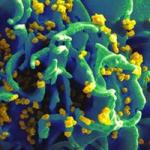
Jonathan Wilson Yewdell, M.D., Ph.D.
Senior Investigator
Cellular Biology and Viral Immunology Section
NIAID/DIR
Research Topics
Viruses pose a constant danger to living organisms. An astounding variety of viruses are recognized as human pathogens. The roster lengthens as humans come into more intimate contact with animal reservoirs harboring novel viruses and new technologies reveal human viruses that previously escaped detection.
The vertebrate immune system evolved in response to the threat posed by viruses. The importance of the immune system in protecting against lethal viral infections becomes obvious in innate or acquired immunodeficiencies, where depression of one or more elements of the system results in death from a typically “self-limited” viral infection, or in the success of vaccines in preventing dangerous viral infections. The immune system (like every biological system) is not perfect, and overzealous anti-viral responses frequently contribute to viral diseases.
The mission of the Cellular Biology Section is to extend basic understanding of the interaction between the host and viruses and to use viruses as tools to better understand cell biology.
Biography
Dr. Yewdell received an A.B. in biochemistry magna cum laude from Princeton University in 1975, working with Dr. Arnold Levine for his undergraduate thesis on immune recognition of virus-transformed cells. He received an M.D. and a Ph.D. in immunology from the University of Pennsylvania in 1981, working with Dr. Walter Gerhard on using monoclonal antibodies to understand influenza A virus hemagglutinin antigenicity and function. As a postdoctoral fellow, he worked with Dr. David Lane at the Imperial College in London, studying the newly discovered p53 protein. From 1983 to 1987, he was an assistant professor at the Wistar Institute in Philadelphia. In 1987, Dr. Yewdell joined the Laboratory of Viral Diseases and in 1993 was appointed to lead its Cellular Biology Section.
Selected Publications
- Ruiz Cuevas MV, Hardy MP, Hollý J, Bonneil É, Durette C, Courcelles M, Lanoix J, Côté C, Staudt LM, Lemieux S, Thibault P, Perreault C, Yewdell JW. Most non-canonical proteins uniquely populate the proteome or immunopeptidome. Cell Rep. 2021;34(10):108815.
- Ho JSY, Angel M, Ma Y, Sloan E, Wang G, Martinez-Romero C, Alenquer M, Roudko V, Chung L, Zheng S, Chang M, Fstkchyan Y, Clohisey S, Dinan AM, Gibbs J, Gifford R, Shen R, Gu Q, Irigoyen N, Campisi L, Huang C, Zhao N, Jones JD, van Knippenberg I, Zhu Z, Moshkina N, Meyer L, Noel J, Peralta Z, Rezelj V, Kaake R, Rosenberg B, Wang B, Wei J, Paessler S, Wise HM, Johnson J, Vannini A, Amorim MJ, Baillie JK, Miraldi ER, Benner C, Brierley I, Digard P, Łuksza M, Firth AE, Krogan N, Greenbaum BD, MacLeod MK, van Bakel H, Garcìa-Sastre A, Yewdell JW, Hutchinson E, Marazzi I. Hybrid Gene Origination Creates Human-Virus Chimeric Proteins during Infection. Cell. 2020;181(7):1502-1517.e23.
- Dersh D, Phelan JD, Gumina ME, Wang B, Arbuckle JH, Holly J, Kishton RJ, Markowitz TE, Seedhom MO, Fridlyand N, Wright GW, Huang DW, Ceribelli M, Thomas CJ, Lack JB, Restifo NP, Kristie TM, Staudt LM, Yewdell JW. Genome-wide Screens Identify Lineage- and Tumor-Specific Genes Modulating MHC-I- and MHC-II-Restricted Immunosurveillance of Human Lymphomas. Immunity. 2021;54(1):116-131.e10.
- Wei J, Kishton RJ, Angel M, Conn CS, Dalla-Venezia N, Marcel V, Vincent A, Catez F, Ferré S, Ayadi L, Marchand V, Dersh D, Gibbs JS, Ivanov IP, Fridlyand N, Couté Y, Diaz JJ, Qian SB, Staudt LM, Restifo NP, Yewdell JW. Ribosomal Proteins Regulate MHC Class I Peptide Generation for Immunosurveillance. Mol Cell. 2019;73(6):1162-1173.e5.
- Angeletti D, Kosik I, Santos JJS, Yewdell WT, Boudreau CM, Mallajosyula VVA, Mankowski MC, Chambers M, Prabhakaran M, Hickman HD, McDermott AB, Alter G, Chaudhuri J, Yewdell JW. Outflanking immunodominance to target subdominant broadly neutralizing epitopes. Proc Natl Acad Sci U S A. 2019;116(27):13474-13479.
Related Scientific Focus Areas
This page was last updated on Monday, August 23, 2021



